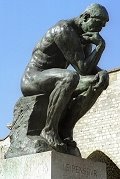But there is a further fact; forgotten also because we moderns forget that there is a female point of view. The woman's wisdom stands partly, not only for a wholesome hesitation about punishment, but even for a wholesome hesitation about absolute rules. There was something feminine and perversely true in that phrase of Wilde's, that people should not be treated as the rule, but all of them as exceptions. Made by a man the remark was a little effeminate; for Wilde did lack the masculine power of dogma and of democratic cooperation. But if a woman had said it it would have been simply true; a woman does treat each person as a peculiar person. In other words, she stands for Anarchy; a very ancient and arguable philosophy; not anarchy in the sense of having no customs in one's life (which is inconceivable), but anarchy in the sense of having no rules for one's mind. To her, almost certainly, are due all those working traditions that cannot be found in books, especially those of education; it was she who first gave a child a stuffed stocking for being good or stood him in the corner for being naughty. This unclassified knowledge is sometimes called rule of thumb and sometimes motherwit. The last phrase suggests the whole truth, for none ever called it fatherwit.
Now anarchy is only tact when it works badly. Tact is only anarchy when it works well. And we ought to realize that in one half of the world--the private house--it does work well. We modern men are perpetually forgetting that the case for clear rules and crude penalties is not self-evident, that there is a great deal to be said for the benevolent lawlessness of the autocrat, especially on a small scale; in short, that government is only one side of life. The other half is called Society, in which women are admittedly dominant. And they have always been ready to maintain that their kingdom is better governed than ours, because (in the logical and legal sense) it is not governed at all. "Whenever you have a real difficulty," they say, "when a boy is bumptious or an aunt is stingy, when a silly girl will marry somebody, or a wicked man won't marry somebody, all your lumbering Roman Law and British Constitution come to a standstill. A snub from a duchess or a slanging from a fish-wife are much more likely to put things straight." So, at least, rang the ancient female challenge down the ages until the recent female capitulation. So streamed the red standard of the higher anarchy until Miss Pankhurst hoisted the white flag.
It must be remembered that the modern world has done deep treason to the eternal intellect by believing in the swing of the pendulum. A man must be dead before he swings. It has substituted an idea of fatalistic alternation for the mediaeval freedom of the soul seeking truth. All modern thinkers are reactionaries; for their thought is always a reaction from what went before. When you meet a modern man he is always coming from a place, not going to it. Thus, mankind has in nearly all places and periods seen that there is a soul and a body as plainly as that there is a sun and moon. But because a narrow Protestant sect called Materialists declared for a short time that there was no soul, another narrow Protestant sect called Christian Science is now maintaining that there is no body. Now just in the same way the unreasonable neglect of government by the Manchester School has produced, not a reasonable regard for government, but an unreasonable neglect of everything else. So that to hear people talk to-day one would fancy that every important human function must be organized and avenged by law; that all education must be state education, and all employment state employment; that everybody and everything must be brought to the foot of the august and prehistoric gibbet. But a somewhat more liberal and sympathetic examination of mankind will convince us that the cross is even older than the gibbet, that voluntary suffering was before and independent of compulsory; and in short that in most important matters a man has always been free to ruin himself if he chose. The huge fundamental function upon which all anthropology turns, that of sex and childbirth, has never been inside the political state, but always outside of it. The state concerned itself with the trivial question of killing people, but wisely left alone the whole business of getting them born. A Eugenist might indeed plausibly say that the government is an absent-minded and inconsistent person who occupies himself with providing for the old age of people who have never been infants. I will not deal here in any detail with the fact that some Eugenists have in our time made the maniacal answer that the police ought to control marriage and birth as they control labor and death. Except for this inhuman handful (with whom I regret to say I shall have to deal with later) all the Eugenists I know divide themselves into two sections: ingenious people who once meant this, and rather bewildered people who swear they never meant it--nor anything else. But if it be conceded (by a breezier estimate of men) that they do mostly desire marriage to remain free from government, it does not follow that they desire it to remain free from everything. If man does not control the marriage market by law, is it controlled at all? Surely the answer is broadly that man does not control the marriage market by law, but the woman does control it by sympathy and prejudice. There was until lately a law forbidding a man to marry his deceased wife's sister; yet the thing happened constantly. There was no law forbidding a man to marry his deceased wife's scullery-maid; yet it did not happen nearly so often. It did not happen because the marriage market is managed in the spirit and by the authority of women; and women are generally conservative where classes are concerned. It is the same with that system of exclusiveness by which ladies have so often contrived (as by a process of elimination) to prevent marriages that they did not want and even sometimes procure those they did. There is no need of the broad arrow and the fleur-de lis, the turnkey's chains or the hangman's halter. You need not strangle a man if you can silence him. The branded shoulder is less effective and final than the cold shoulder; and you need not trouble to lock a man in when you can lock him out.
The same, of course, is true of the colossal architecture which we call infant education: an architecture reared wholly by women. Nothing can ever overcome that one enormous sex superiority, that even the male child is born closer to his mother than to his father. No one, staring at that frightful female privilege, can quite believe in the equality of the sexes. Here and there we read of a girl brought up like a tom-boy; but every boy is brought up like a tame girl. The flesh and spirit of femininity surround him from the first like the four walls of a house; and even the vaguest or most brutal man has been womanized by being born. Man that is born of a woman has short days and full of misery; but nobody can picture the obscenity and bestial tragedy that would belong to such a monster as man that was born of a man.
Previous G.K. Chesterton Index Next
Search This Blog
The Jiggly Room
Polk High
The Encyclopedia Marxofeminist

Feminist "Equality" Includes The Loss of Free Speech
Sheeple Fighting Back!
- Black Sheep - You Tube (2min)
- Symantec (SYMC - NASDAQ) Downgraded to "Sell"
- Problems With Norton Internet Security?
- Cypress CEO Responds to Nun's Urging a "Politically Correct" Board Make-Up
- Do You Believe Women Have the Right to Free Speech?
- Canadian Feminists Getting Worried?
- Seven Ways To Get Traffic Without Google
Not All Women Are Like That! (NAWALT)
Myths, Legends & Religions

You are not god. Learn to observe without judging.

- Cypress CEO Responds to Nun's Urging a 'Politically Correct' Board Make-up
- The Baby Bomb: How the Boomers were Used to Demolish a Culture
- Statement of Bill Wood to the Committee on Ways and Means
- Why Did Feminists Attack the Family? -- by Heretical Sex
- Political Correctness - The Revenge of Marxism -- by Baron Bodissey
- Are Americans Practicing Communism? (The Ten Planks of the Communist Manifesto)
"We can't expect the American People to jump from Capitalism to Communism, but we can assist their elected leaders in giving them small doses of Socialism, until they awaken one day to find that they have Communism." -- Nikita Krushchev

THE ANIMAL FARM REALITY OF "FEMINIST EQUALITY:"
"Differences [between men and women], including the products of social inequality, MAKE UNEQUAL TREATMENT NOT UNEQUAL AT ALL." -- Catharine MacKinnon, "Reflections on Sex Equality Under Law," Yale Law Journal, 1991
Blog Archive
-
▼
2003
(151)
-
▼
January
(150)
- The Woman Question -- by Stephen Leacock (1916)
- Woman's Fickleness -- The Folk-Lore of Women -- by...
- Local Allusions to Women -- The Folk-Lore of Women...
- Red Haired Girls -- The Folk-Lore of Women -- by T...
- Woman's Secrets -- The Folk-Lore of Women -- by T....
- Love Tests -- The Folk-Lore of Women -- by T.F. Th...
- Woman's Hate -- The Folk-Lore of Women -- T.F. Thi...
- Woman's Love -- The Folk-Lore of Women -- T.F. Thi...
- Bad Women -- The Folk-Lore of Women -- T.F. Thiste...
- Woman's Goodness -- The Folk-Lore of Women -- by T...
- Woman's Tongue -- Folk-lore of Women -- by T.F. Th...
- Woman's Eyes -- The Folk-lore of Women -- T.F. Thi...
- Woman's Dress -- The Folk-lore of Women -- by T.F....
- Woman's Beauty -- The Folk-lore of Women -- by T.F...
- Woman's Characteristics -- Folk-lore of Women -- b...
- Preface, The Folk-Lore of Women -- by T.F. Thistel...
- Folklore of Women -- by T.F. Thistelton-Dyer (1906)
- I. On Female Suffrage -- by G.K. Chesterton
- XIV. Folly and Female Education -- by G.K. Chesterton
- V. An Evil Cry -- by G.K. Chesterton
- XII. The Modern Slave -- by G.K. Chesterton
- XI. The Queen and the Suffragettes
- X. The Higher Anarchy -- by G.K. Chesterton
- IX. Sincerity and the Gallows -- by G.K. Chesterton
- VIII. The Brand of the Fleur-de-lis -- by G.K. Che...
- VII. The Modern Surrender of Woman
- VI. The Pedant and the Savage - by G.K. Chesterton
- V. The Coldness of Chloe -- by G.K. Chesterton
- IV. The Romance of Thrift -- by G.K. Chesterton
- III. The Emancipation of Domesticity -- by G.K. Ch...
- II. The Universal Stick -- by G.K. Chesterton
- I. The Unmilitary Suffragette -- by G.K. Chesterton
- III The Common Vision -- by G.K. Chesterton
- II Wisdom And The Weather -- by G.K. Chesterton
- Part One: The Homelessness of Man -- by G.K. Chest...
- What's Wrong With The World -- by G.K. Chesterton ...
- (From) Principles of Psychology -- by William James
- (From) New Introductory Lectures on Psycho-Analysi...
- Need It Be So? - by Leo Tolstoy (1900)
- Virginibus Puerisque - Chapter One - By Robert Lou...
- The Intimate Journal of Henri Amiel: August 8, 1876
- The Intimate Journal of Henri Amiel: May 21, 1868
- A Collection of Writings on Women -- Freiderich Ne...
- The Intimate Journal of Henri Amiel: April 26, 1868
- The Intimate Journal of Henri Amiel: September 17,...
- The Intimate Journal of Henri Amiel: March 25, 1878
- The Intimate Journal of Henri Amiel: March 24, 1878
- The Intimate Journal of Henri Amiel: February 1, 1876
- The Intimate Journal of Henri Amiel: February 15, ...
- The Intimate Journal of Henri Amiel: April 2, 1873
- The Intimate Journal of Henri Amiel: February 16, ...
- The Intimate Journal of Henri Amiel: May 6, 1852
- The Intimate Journal of Henri Amiel: May 3, 1852
- The Intimate Journal of Henri Amiel: April 3, 1873
- The Intimate Journal of Henri Amiel: December 11, ...
- The Intimate Journal of Henri Amiel: April 1, 1870
- The Intimate Journal of Henri Amiel: May 13, 1869
- The Intimate Journal of Henri Amiel: December 26, ...
- The Intimate Journal of Henri Amiel - March 17, 1868
- The Intimate Journal of Henri Amiel (selections)
- Woman/Man -- From Kierkegaard's Journals
- On Women - by Arthur Schopenhauer, 1851
- IN VINO VERITAS (or THE BANQUET) -- by Soren Kierk...
- The Metaphysics of the Love of the Sexes - by Arth...
- Democracy in America, Vol. 2, Ch. XII, "How The Am...
- A Bachelor's Complaint of the Behaviour of Married...
- Tom Pry's Wife -- by Charles Lamb (1775-1834)
- Thomas Jefferson - The Aristocracy of Beauty
- Thomas Jefferson - Random Remarks as a Young Man
- Thomas Jefferson - A Bill for Proportioning Crimes...
- Thomas Jefferson - On Mrs. Merry [Wife of British ...
- Thomas Jefferson - On Marie Antoinette
- Thomas Jefferson - Religion and The University
- Thomas Jefferson - Commerce, War, and Revolution
- Thomas Jefferson - Amazons and Angels
- Thomas Jefferson - On European Education
- Thomas Jefferson (selections)
- Letter to His Son (excerpt) -- by Lord Chesterfiel...
- The Spirit of Laws - Book XXVII
- The Spirit of Laws - Book XIX
- The Spirit of Laws - Book XVII
- The Spirit of Laws - Book XVI
- The Spirit of Laws - Book VII
- The Spirit of Laws (excerpts) -- Baron de Montesqu...
- Man Superior to Woman - Conclusion
- Man Superior to Woman - Chapter Six
- Man Superior to Woman - Chapter Five
- Man Superior to Woman - Chapter Four
- Man Superior to Woman - Chapter Three
- Man Superior to Woman - Chapter Two
- Man Superior to Woman - Chapter One
- Man Superior to Woman - Introduction
- Man Superior to Woman - Dedication to the Ladies
- Man Superior to Woman -- by A Gentleman, 1739
- Memoirs Of Louis XIV And The Regency, Vol. III, Ch...
- "The Man-Woman" -- Hic Mulier, 1620
- The Fifteen Joys of Marriage (first two "joys") --...
- Termination of the Female Sex - Mathieu of Boulogne
- Monstrous Woman - Mathieu of Boulogne
- Mother of Calamity - Mathieu of Boulogne
-
▼
January
(150)

"Only an armed people can be the real bulwark of popular liberty." -- V.I. Lenin
Repeal the Canadian Gun Registry

"A system of licensing and registration is the perfect device to deny gun ownership to the bourgeoisie." -- V.I. Lenin
"We shall destroy you from within!" -- Nikita Krushchev, during the Kitchen Debate, 1959
"Self Made Man" - Sculpture by Bobbie Carlyle
Websites
The Demographic Trap

"Destroy the family, you destroy the country." -- V.I. Lenin
"America is like a healthy body and its resistance is threefold: its patriotism, its morality, and its spiritual life. If we can undermine these three areas, America will collapse from within." -- Josef Stalin
Back to the Bible
A Non-Bible Thumper Point of View
"The aim of socialism is not only to abolish the present division of mankind into smaller states and all-national isolation, not only to bring the nations closer to each other, but also to merge them." -- V.I. Lenin
No Thanks - We'd Rather Be Canadian!
Man-Made Global Warming is a Hoax being used to bring about Global Communism (Globalization)

"Every collectivist revolution rides in on a Trojan horse of 'emergency'. It was the tactic of Lenin, Hitler, and Mussolini. In the collectivist sweep over a dozen minor countries of Europe, it was the cry of men striving to get on horseback. And 'emergency' became the justification of the subsequent steps. This technique of creating emergency is the greatest achievement that demagoguery attains." -- Herbert Hoover
Beware the Cultural Marxism of Environmentalists
"The threat of environmental crisis will be the 'international disaster key' that will unlock the New World Order." -- Mikhail Gorbachev, quoted in "A Special Report: The Wildlands Project Unleashes Its War On Mankind", by Marilyn Brannan, Associate Editor, Monetary & Economic Review, 1996, p. 5

ABOLISH THE UNITED NATIONS
The Marxism of Multi-Culturalism

"Tolerance is how far a mechanical part can deviate from the norm before it screws up the entire machine." -- Any Mechanic
The Grinch That Steals Children's Souls

"Give us the child for 8 years and it will be Bolshevik forever." -- V.I. Lenin
"We must declare openly what is concealed, namely, the political function of the school...It is to construct communist society." -- V.I. Lenin
Extra, Extra!



"The oppressed are allowed once every few years to decide which particular representatives of the oppressing class are to represent them." -- Karl Marx
The Liberal Party of Canada = Cultural Marxist Agenda
- The Real Pierre Trudeau: Father of Canada's Permissive Society -- by Steve Jalsevac
- Pierre Elliot Trudeau - Cultural Marxist Wrapped In a Canadian Flag
- The Multi-Tasking Pink Proletariat
- The Right Dishonourable Paul Martin Wants Canadians to "Give Up A Little Of Our Sovereignty To Make The World Work." -- YouTube 2:38 (Maybe We Should Lock Him Up To Make Canada Work!)
Congratulations, Karl Marx!

Marxism Links (For Researching)

- A Brief Overview of Marxism: "Communist (Community) Oriented Policing" - by Phil Worts
- Antonio Gramsci - Collected Works, including the Prison Notebooks
- Antonio Gramsci's Life & His Marxist Theories Explained
- Communist Manifesto - by Karl Marx & Frederick Engels
- Herbert Marcuse Official Homepage
- Herbert Marcuse, Haters of
- Marxists Internet Archive
- The Conflict Tradition
- Women and Marxism
Rule by Science

Philosophy Corner

“Dialectical thought is related to vulgar thinking in the same way that a motion picture is related to a still photograph. The motion picture does not outlaw the still photograph but combines a series of them according to the laws of motion.” -- Leon Trotsky
Dialectical Thought is a Cornerstone of Marxism, and Feminism (Because They Are One In the Same)
The Marxist Dialectic's Zig-Zag

Wishing to advance in a room full of people, I do not walk through the aisle and straight toward my goal. Nor do I move slowly through the crowd shaking hands with friends and acquaintences, discussing points of interest, gradually nearing the objective. The dialectical pathway is different. It consists of a resolute forward advance followed by an abrubt turn and retreat. Having retreated a distance there is another turn and advance. Through a series of forwardbackward steps the goal is approached. To advance thus is to advance dialectically. The Communist goal is fixed and changeless, but their direction of advance reverses itself from time to time. They approach their goal by going directly away from it a considerable portion of the time. Lenin wrote the textbook, One Step Forward, Two Steps Back. Chinese Communist schoolchildren are taught to do the dialectical march taking three steps forward and two steps back. If we judge where the Communists are going by the direction in which they are moving we will obviously be deceived -- Dr. Fred Schwarz, President of Christian Anti-Communism Crusade
Critical Theory

All's Fair In Love and War


The Matriarchy Lives! (Click Picture)

"I am most anxious to enlist everyone who can speak or write to join in checking this mad, wicked folly of 'Women's Rights', with all its attendant horrors, on which her poor feeble sex is bent, forgetting every sense of womanly feelings and propriety. Feminists ought to get a good whipping. Were woman to 'unsex' themselves by claiming equality with men, they would become the most hateful, heathen and disgusting of beings, and would surely perish without male protection." -- Queen Victoria, 1870


Please Give Manginas the Respect They Deserve: NONE!

























